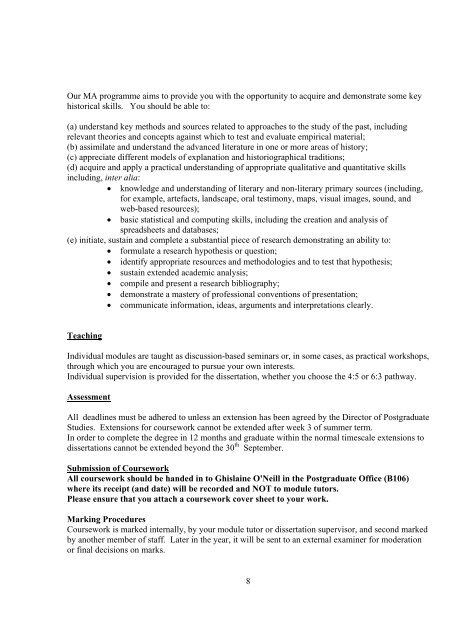M.A. in History Student Handbook 2011-2012
M.A. in History Student Handbook 2011-2012
M.A. in History Student Handbook 2011-2012
Create successful ePaper yourself
Turn your PDF publications into a flip-book with our unique Google optimized e-Paper software.
Our MA programme aims to provide you with the opportunity to acquire and demonstrate some key<br />
historical skills. You should be able to:<br />
(a) understand key methods and sources related to approaches to the study of the past, <strong>in</strong>clud<strong>in</strong>g<br />
relevant theories and concepts aga<strong>in</strong>st which to test and evaluate empirical material;<br />
(b) assimilate and understand the advanced literature <strong>in</strong> one or more areas of history;<br />
(c) appreciate different models of explanation and historiographical traditions;<br />
(d) acquire and apply a practical understand<strong>in</strong>g of appropriate qualitative and quantitative skills<br />
<strong>in</strong>clud<strong>in</strong>g, <strong>in</strong>ter alia:<br />
• knowledge and understand<strong>in</strong>g of literary and non-literary primary sources (<strong>in</strong>clud<strong>in</strong>g,<br />
for example, artefacts, landscape, oral testimony, maps, visual images, sound, and<br />
web-based resources);<br />
• basic statistical and comput<strong>in</strong>g skills, <strong>in</strong>clud<strong>in</strong>g the creation and analysis of<br />
spreadsheets and databases;<br />
(e) <strong>in</strong>itiate, susta<strong>in</strong> and complete a substantial piece of research demonstrat<strong>in</strong>g an ability to:<br />
• formulate a research hypothesis or question;<br />
• identify appropriate resources and methodologies and to test that hypothesis;<br />
• susta<strong>in</strong> extended academic analysis;<br />
• compile and present a research bibliography;<br />
• demonstrate a mastery of professional conventions of presentation;<br />
• communicate <strong>in</strong>formation, ideas, arguments and <strong>in</strong>terpretations clearly.<br />
Teach<strong>in</strong>g<br />
Individual modules are taught as discussion-based sem<strong>in</strong>ars or, <strong>in</strong> some cases, as practical workshops,<br />
through which you are encouraged to pursue your own <strong>in</strong>terests.<br />
Individual supervision is provided for the dissertation, whether you choose the 4:5 or 6:3 pathway.<br />
Assessment<br />
All deadl<strong>in</strong>es must be adhered to unless an extension has been agreed by the Director of Postgraduate<br />
Studies. Extensions for coursework cannot be extended after week 3 of summer term.<br />
In order to complete the degree <strong>in</strong> 12 months and graduate with<strong>in</strong> the normal timescale extensions to<br />
dissertations cannot be extended beyond the 30 th September.<br />
Submission of Coursework<br />
All coursework should be handed <strong>in</strong> to Ghisla<strong>in</strong>e O'Neill <strong>in</strong> the Postgraduate Office (B106)<br />
where its receipt (and date) will be recorded and NOT to module tutors.<br />
Please ensure that you attach a coursework cover sheet to your work.<br />
Mark<strong>in</strong>g Procedures<br />
Coursework is marked <strong>in</strong>ternally, by your module tutor or dissertation supervisor, and second marked<br />
by another member of staff. Later <strong>in</strong> the year, it will be sent to an external exam<strong>in</strong>er for moderation<br />
or f<strong>in</strong>al decisions on marks.<br />
8
















